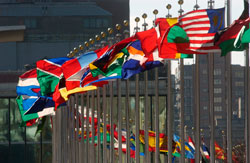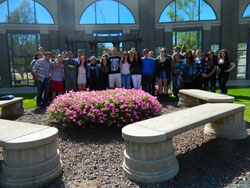The University Political Science Department offers a number of programs to create unique opportunities such as the International Relations concentration which focuses on international problems, in hopes to compete in a globally connected world.
The concentration, which is an additional area of study within the standard political science curriculum, aims to provide students with an understanding of more than just the Western-centric perspective on international concerns. Political science majors who add the nine-credit concentration to their academic repertoire are required to take one class on comparative politics as well as two courses devoted to the study of both international relations theory as well as studies of ethics of international relations or American foreign policy.
Dr. Saliba Sarsar, professor of political science and Associate Vice President for Global Initiatives, believes that it is of utmost importance that students of political science have strong foundations in international relations given the increasingly globalized and interdependent nature of the modern world.
Sarsar states, “Students of international relations become more aware and better immersed in the historical background and basic information of a variety of issues and by whom any how they can be addressed.”
Dr. Charles Cotton, professor of political science, seconds the notion that students with backgrounds in international relations will enjoy a leg up on the competition when beginning their career search within today’s competitive job market, particularly when students couple their knowledge of international affairs with the study of foreign languages and cultures.
Cotton argues, “By learning another language, one not only learns to speak and comprehend the vernacular, one also learn to understand and embrace the intricacies of a given culture or society.
Cotton also spoke about the implications that learning another language has with respect to breaking down barriers of cultural misunderstanding and personal egoism, stating, “It is amazing to see how humble people become and how much more willing they are to accept others once they learn a new language; this is paramount in the 21st Century.”
Laura Migliore, a junior political science minor, said, “I feel that many students today lose sight of just how large and diverse this world really is. To be good citizens, we must learn as much as we possibly can about the happenings in our world and how we function within our global society.”
Migliore also added that her studies of the Spanish language have also served to broaden her outlook on other aspects of international affairs such as cultural differences, “I’ve really learned that there are no black and white aspects of our world; every place on Earth has a story and heritage all its own and that truly needs to be respected.”
Students can learn about other countries, governments and economies and relate it back to the connected world we now live in. The combination of international relations and a language can help students see more than what meets the eye.
Another option of classes is comparative politics. These courses take countries from a region and compare them to each other. This course compares areas such as the Middle East and South America.
In a highly-complex and deeply interconnected world where vast oceans, formerly barriers, are now highways, and cultures, once isolated, are now proactively interfacing with one another on a daily basis. The international relations concentration promises to give students the tools necessary to spread their wings and to set out beyond the horizon to become able and informed leaders.
According to the University Political Science Department webpage, students who study international relations can find themselves a variety of career options. Some of the options include working at the United States State Department; deal with international business deals among others options.
IMAGE TAKEN from www.theadvocatesforhumanrights.org


